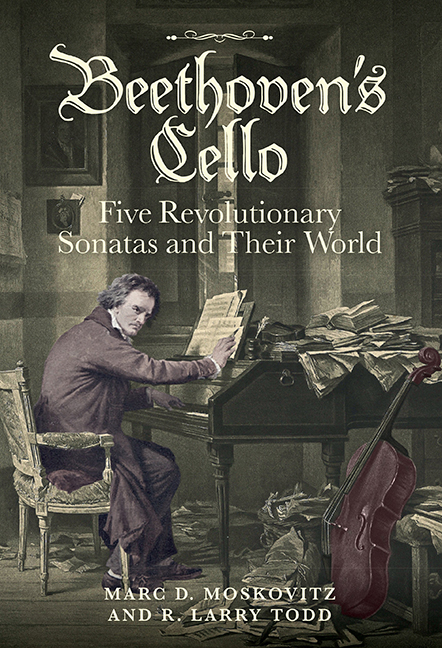Book contents
- Frontmatter
- Dedication
- Epigraph
- Contents
- Illustrations
- Foreword by Steven Isserlis
- Preface
- Personalia
- 1 From Bonn to Berlin
- 2 Music Fit for a King: The Sonata in F major Op. 5 No. 1 (1796)
- Interlude: Beethoven's Cellos
- 3 Tragic/Comic Masks: The Sonata in G minor Op. 5 No. 2 (1796)
- Interlude: Beethoven's Pianos
- 4 Themes and Variations
- Interlude: The Triple Concerto as Outlier
- 5 Friendship, War, Tears, and Grief: The Sonata in A major Op. 69 (1808)
- 6 Freedom and Control: The Sonata in C major Op. 102 No. 1 (1815)
- 7 ‘Most Remarkable and Strange’: The Sonata in D major Op. 102 No. 2 (1815)
- Interlude: Arranged Sonatas
- 8 Opus Posthumum
- Appendix 1 Primary Sources of Beethoven's Music for Cello and Piano
- Appendix 2 Reviews of Beethoven's Cello Music by His Contemporaries
- Notes
- Bibliography
- Index of Works by Beethoven
- General Index
Personalia
Published online by Cambridge University Press: 18 April 2018
- Frontmatter
- Dedication
- Epigraph
- Contents
- Illustrations
- Foreword by Steven Isserlis
- Preface
- Personalia
- 1 From Bonn to Berlin
- 2 Music Fit for a King: The Sonata in F major Op. 5 No. 1 (1796)
- Interlude: Beethoven's Cellos
- 3 Tragic/Comic Masks: The Sonata in G minor Op. 5 No. 2 (1796)
- Interlude: Beethoven's Pianos
- 4 Themes and Variations
- Interlude: The Triple Concerto as Outlier
- 5 Friendship, War, Tears, and Grief: The Sonata in A major Op. 69 (1808)
- 6 Freedom and Control: The Sonata in C major Op. 102 No. 1 (1815)
- 7 ‘Most Remarkable and Strange’: The Sonata in D major Op. 102 No. 2 (1815)
- Interlude: Arranged Sonatas
- 8 Opus Posthumum
- Appendix 1 Primary Sources of Beethoven's Music for Cello and Piano
- Appendix 2 Reviews of Beethoven's Cello Music by His Contemporaries
- Notes
- Bibliography
- Index of Works by Beethoven
- General Index
Summary
Albrechtsberger, Johann Georg (1736–1809). Austrian theorist, composer, and teacher of some of the most highly respected musicians of the age, including Johann Nepomuk Hummel, Ignaz Moscheles, Anton Reicha, Josef Weigl, and Beethoven. Having turned to Albrechtsberger for lessons in counterpoint following Haydn's departure for London at the start of 1794, Beethoven continued his studies with the noted pedagogue for about a year and a half.
Amenda, Karl (1771–1836). Violinist and theologian. Despite the brevity of his time in Vienna (1798–99), Amenda became one of Beethoven's closest companions and was among the earliest to learn of the composer's encroaching deafness. Beethoven gave Amenda an early version of his first string quartet, Op. 18 No. 1, though after substantive revisions and admitting that he had only ‘now learned to write quartets’, Beethoven asked that it not be circulated, a request Amenda honored.
Artaria, Carlo (1747–1808). Mapmaker and among the foremost European publishers of engraved music from 1778. Founded in Mainz in 1756, Artaria's firm moved to Vienna in 1770, where it served as Mozart's major publisher (releasing some forty-five works during the composer's lifetime), represented Haydn (publishing over three hundred works), and was among the first houses to do business with the young Beethoven. After 1804, the firm passed to Domenico Artaria (1775–1842), who continued to represent Beethoven, among others.
Braun, Josephine, Baroness, née von Högelmüller (1765–1838). Dedicatee of Beethoven's Horn Sonata Op. 17 and the two Piano Sonatas Op. 14, in addition to an arrangement for string quartet of Op. 14 No. 1. Josephine was the wife of Peter Anton Braun, who leased and managed Vienna's two court theaters, the Kärntnertortheater and Burgtheater, and in 1804 became owner of the Theater an der Wien. Thus, dedications to the Brauns were probably driven as much by political as by personal reasons.
Breitkopf & Härtel. See Härtel.
Breuning, Stephan von (1774–1827). Breuning, whose family was well known to Beethoven's in Bonn, enjoyed one of the longest-lasting friendships with Beethoven. Their relationship was renewed when Breuning moved to Vienna in 1801; though it experienced the inevitable falling-out that marred many of the composer's relationships, the two warmly reconciled. Employed by the war ministry of Vienna, Breuning revised the original libretto of Fidelio and, perhaps as a consequence, received the dedication of the Violin Concerto.
- Type
- Chapter
- Information
- Beethoven's Cello: Five Revolutionary Sonatas and Their World , pp. xv - xxivPublisher: Boydell & BrewerPrint publication year: 2017

